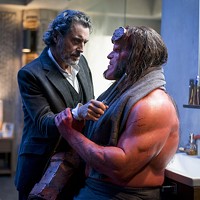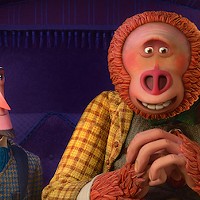

When did the Academy of Motion Picture Arts & Sciences turn into the United Nations? The folks who hand out those golden Oscars have always been fairly friendly to the world that exists outside U.S. borders, sometimes to a fault (just ask Roberto Benigni). But this year, perhaps in a subconscious repudiation of all the hysteria surrounding immigrants, the organization has been particularly cozy with foreigners from across the globe.
In the acting categories alone, the nominees hail from such diverse countries as Spain, Mexico, Japan, Benin, Ireland, Australia and, of course, England. The technical categories expand the boundaries to include France, Italy and Hungary, among others. And this doesn't even take into account the Best Foreign-Language Film nominees, which include works from Denmark, Algeria and Canada.
It's rare for a non-English-language film to crack the Best Picture ranks, but here's Letters From Iwo Jima, with practically all of its dialogue in Japanese. And while Babel contains plenty of English, significant chunks of dialogue are spoken in Spanish, Japanese and Berber.
In other all-inclusive news, this race also sets a new record for the number of blacks to receive acting nods. True, Dreamgirls didn't get its expected Best Picture nomination (though it still leads the field with eight citations), but feeble protests of racism never gained much traction, and with good reason. It's hard for this charge to stick when five of the 20 acting nominees are black; furthermore, the film's creators who were denied nominations in the Picture, Director and Adapted Screenplay categories are all white. Instead, Dreamgirls most likely fell victim to the excessive hype that was declaring it the best picture of the year all the way back in the summer, before anybody had even seen it. In that sense, it's most like Cold Mountain and Memoirs of a Geisha, two other heavily promoted Oscar-bait titles that underwhelmed Academy members (as well as many critics) when it came time to mark those ballots.
Here, then, are some more observations about this year's crop.
Highlights:
• The Best Director nomination for United 93's Paul Greengrass. With the exception of The Departed's Martin Scorsese, Greengrass has copped more critics' prizes for his mesmerizing work than any other director this past year. And if the 9/11 drama had any chance of cracking the Oscar ranks, it was in this category, which in the past has often recognized daring achievements that the other branches were too timid to even consider. As examples, think Scorsese for The Last Temptation of Christ and David Lynch for Blue Velvet and Mulholland Drive, the helmers of three titles that were otherwise shut out of their respective Oscar races. The other maverick group in the Academy tends to be the writing contingent, but oddly, United 93 failed to earn a nod for Best Original Screenplay. In addition to Greengrass, though, it did manage a nomination for Best Film Editing.
• The six nominations for Pan's Labyrinth. Wow, what a terrific showing for one of the best films of the year; only Dreamgirls and Babel scored more nods (The Queen also nabbed six). Unless the plotline concerns itself with Hobbits, the Academy tends to ignore fantasy flicks except in the technical categories. But two of this film's nods came in major categories, Best Foreign-Language Film and Best Original Screenplay. With Pedro Almodovar's Volver unexpectedly absent from the foreign lineup, Labyrinth is the clear-cut frontrunner for that statue.
• The Best Supporting Actor nod for Little Children's Jackie Earle Haley. This wasn't exactly a surprise, as Haley had been racking up awards (six total) throughout the awards season. But Haley's performance as a former child molester deserves its slot, and besides, who doesn't like a comeback story? A popular child actor in the 1970s (The Bad News Bears, Breaking Away), Haley gradually disappeared from the scene, and it had been 13 years since his last film role before he reappeared last year in both Little Children and All the King's Men. In the interim, his jobs included pizza delivery man, limousine driver and security guard.
• The Best Documentary nomination for Deliver Us From Evil. In a great year for nonfiction films, this expose about a pedophilic priest was by far my favorite, and I'm thrilled it was honored. In fact, don't look for the equivalent of penguins in this year's crop: All of the nominees are topical and torn from the headlines. An Inconvenient Truth centers on global warming, Jesus Camp looks at the dangers of religious brainwashing, and Iraq In Fragments and My Country, My Country both focus on Bush's disastrous war. And speaking of our, uh, glorious leader, the surprise omission in this category is Shut Up & Sing, the entertaining film about the furor caused by the Dixie Chicks' controversial (but accurate) take on Bush. A pity it wasn't nominated: How could the Academy pass up a chance to show the clip in which American patriot Natalie Maines calls Bush "a dumb fuck"?
• Single citations for underperforming films. Look past such debacles as the homophobic Brokeback Mountain shunning last year, and it's clear that integrity does exist within the Academy ranks, as evidenced by the fact that the technical branches have never had any problem handing out deserved nods to pictures that proved to be either critical or commercial (or both) disappointments. Brian De Palma's The Black Dahlia was lambasted by the critics (unfairly, I would opine) and skipped by audiences, but there's no denying its gorgeous presentation, and veteran lenser Vilmos Zsigmond was rightly singled out for Best Cinematography. Likewise, Sofia Coppola's Marie Antoinette and Zhang Yimou's Curse of the Golden Flower were showcases for gorgeous period dresses, and both snagged Best Costume Design nods. And The Good Shepherd and The Good German, two dramas whose reviews were more mixed than anticipated, were recognized for Best Art Direction & Set Decoration and Best Original Score, respectively.
Low Points:
• No love for the supporting Brits. The two best supporting turns of the year came courtesy of Emily Blunt (as Meryl Streep's frazzled assistant) in The Devil Wears Prada and Michael Sheen (as Prime Minister Tony Blair) in The Queen. These were two marvelous performances that earned some buzz early on (a Golden Globe nom for Blunt, the Los Angeles Film Critics Association Award for Sheen) but inexplicably faded as the season progressed. Their slighting was the biggest bummer come nomination announcement time.
• No Best Picture nomination for United 93. This galvanizing motion picture was the year's most acclaimed (see How They Compare sidebar), but it was a tough sell for Academy love right from the start. It premiered early in the year, it featured no recognizable actors around which to build campaigns (a la Brad Pitt in Babel), and its subject matter insured that many members wouldn't even pop it into the DVD player lest it disturb them too much.
• The ample love for Blood Diamond. Frankly, I don't get the positioning of this film as a year-end award contender, a strategy that nevertheless paid off with five nominations. Take away the self-important stance and you're basically left with a buddy action flick that usually stars the likes of The Rock and Martin Lawrence. And while Leonardo DiCaprio is fine in the lead role, I would have preferred that his Best Actor nomination had come for The Departed, since that movie will need all the clout it can muster to knock off the overrated Babel for the Best Picture Oscar.
• The shutouts. As always, some terrific movies were ignored completely. It was a long shot that Aaron Eckhart would be up for Best Actor for his note-perfect work in Thank You For Smoking, but a nod for that picture in the Best Adapted Screenplay category was almost a given. Sadly, it proved to be a no-go. In addition to being the best Bond film in forever, Casino Royale was also a technical treat, certainly worthy of mentions in such categories as Best Film Editing and Best Sound. Alas, the Academy gave it double-oh-nothing noms. Finally, a Best Director nomination for A Prairie Home Companion's Robert Altman would have been a lovely -- and, given the picture's high quality, deserving -- way to bid farewell in style to this great filmmaker.
Other Points of Interest:
• By earning her 14th Oscar nomination for her work in The Devil Wears Prada, Meryl Streep added to her own record for the most nods for a performer. Katharine Hepburn and Jack Nicholson are tied for second place, with 12 nominations each. Nicholson could have moved into second place all by himself had he been nominated for The Departed (as many expected), but the only performer recognized from that picture turned out to be Mark Wahlberg.
• With eight nominations, Peter O'Toole (Venus) now is the sole record holder for most nominations without a win. Previously, he had been tied with Richard Burton at seven apiece. Among women, both Deborah Kerr and Thelma Ritter have been nominated six times without ever winning, though Kate Winslet is moving up the ranks: Her nod this year for Little Children marks her fifth nomination, and she has yet to take home a statue.
• The year's two magician movies, The Prestige and The Illusionist, are competing against each other in the Best Cinematography category. The Prestige picked up a second nod for Best Art Direction & Set Decoration.
• Despite earning some of the year's best reviews, Children of Men was largely MIA during awards season. Happily, the Academy noticed its merits, nominating it for Best Adapted Screenplay, Best Cinematography and Best Film Editing.
• Sacha Baron Cohen may have missed out on a Best Actor nomination for Borat: Cultural Learnings of America for Make Benefit Glorious Nation of Kazakhstan, but he still figures in this year's contest, earning a nod (along with his four co-writers) for Best Adapted Screenplay. As Borat would say, "Nice!"
HOW THEY COMPARE
Oscar's 5 Best
These were the films nominated by the Academy for Best Picture.
1. Babel (7 nominations)
2. The Queen (6)
3. The Departed (5)
4. Letters From Iwo Jima (4)
5. Little Miss Sunshine (4)
Critics' 5 Best
Based on a national sampling of 200 reviewers, these were the films that appeared the most frequently on critics' 10 Best lists.
1. United 93
2. The Queen
3. The Departed
4. Letters From Iwo Jima
5. Pan's Labyrinth
(Primary source: www.moviecitynews.com)
Brunson's 5 Best
These were my picks for the year's best movies.
1. United 93
2. A Prairie Home Companion
3. The Queen
4. Thank You For Smoking
5. Letters From Iwo Jima
Moviegoers' 5 Best
These were the year's biggest moneymaking releases.
1. Pirates of the Caribbean: Dead Man's Chest
2. Cars
3. X-Men: The Last Stand
4. The Da Vinci Code
5. Night at the Museum
(Source: www.imdb.com)
...AND THE WORST
OK, we now have a sense of which films reigned as the biggest and/or best of 2006. But what about the worst? Glad you asked. We took a look at the "10 Worst" lists of 30 national critics and discovered that the following titles appeared most often:
1. Basic Instinct 2
2. Lady In the Water
3. The Wicker Man
4. Little Man
5. All the King's Men




